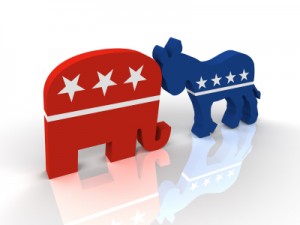By Kyle Roberts
 To preserve our freedom, the U.S. legal code must separate political parties from government, and citizens must learn to consider more than the Democratic and Republican parties.
To preserve our freedom, the U.S. legal code must separate political parties from government, and citizens must learn to consider more than the Democratic and Republican parties.
Republics throughout history have always been dominated by self-serving parties whose goals are adverse to the rights and combined interests of the people. Ours is no exception, but it is time that changed.
Rather than fighting present realities, we must change the model that created them, and those discouraging realities will change automatically.
Most of the founders loathed parties. Political parties have rarely been non-biased pursuers of liberty. In essence, political parties are simply privileged civic clubs with pet projects, favorite issues, internal intrigue, a special privilege of being intimately connected with government operations, and goals for obtaining and maintaining power.
Why are we the people so fixed on our current two-party system? What lasting value does it really have in reference to the life, liberty, and unalienable (non-transferable) rights of men?
Do we believe that freedom cannot exist apart from the two dominant parties?
We are the masters of this nation, and we have the power to put any political party or system out of business just as fast as we could a regular retail store by deciding not to shop there.
Our long overdue political paradigm shift away from this structure can be summarized in these words from George Washington’s Farewell Address:
“All obstructions to the execution of the laws, all combinations and associations, under whatever plausible character, with the real design to direct, control, counteract, or awe the regular deliberation and action of the constituted authorities, are destructive…and of fatal tendency. They serve to organize faction, to give it an artificial and extraordinary force; to put, in the place of the delegated will of the nation the will of a party…
“The alternate domination of one faction over another, sharpened by the spirit of revenge, natural to party dissension, which in different ages and countries has perpetrated the most horrid enormities, is itself a frightful despotism. But this leads at length to a more formal and permanent despotism.
“Without looking forward to an extremity of this kind (which nevertheless ought not to be entirely out of sight), the common and continual mischiefs of the spirit of party are sufficient to make it the interest and duty of a wise people to discourage and restrain it.”
Are we wise and courageous enough to fulfill our duty of discouraging and restraining the mischiefs of party?
Legislative Damage Caused By the System
The primary debate in our elections, legislative chambers, and executive offices is not about what it should be: the securing and protection of the rights of the people. Instead, we have the same scenario James Madison lamented in “Federalist 10” and sought to overcome:
“Complaints are everywhere heard from our most considerate and virtuous citizens, equally the friends of public and private faith, and of public and personal liberty; that our governments are too unstable; that the public good is disregarded in the conflicts of rival parties.
“Measures are too often decided, not according to the rules of justice, and the rights of the minor party; but by the superior force of an interested and over-bearing majority.
“The prevailing and increasing distrust of public engagements, and alarm for private rights, which are echoed from one end of the continent to the other…must be chiefly, if not wholly, effects of the unsteadiness and injustice, with which a factious spirit has tainted our public administrations.”
Here are a few things — all of them adverse to freedom — that both of the dominant parties have brought to this nation:
- Unconstitutional foreign wars and involvement;
- Unconstitutional internal improvement tax schemes designed to support certain businesses and localities over others; also called bringing home the bacon to your local district;
- A heavy progressive or graduated income tax;
- Centralization of credit and money in the hands of the state, by means of a national bank and an exclusive monopoly;
- Free education for all children in government-run public schools and the combination of education with industrial production;
- The redistribution of wealth through government programs and bailouts;
- The combination of agriculture with manufacturing industries and the subsidizing of the cash crop market;
- Unconstitutional involvement and regulation in business and private life;
- The confiscation of real money (gold/silver) and the virtual outlawing of their use through legal tender laws;
- Complete and total corruption of the electoral college as originally intended, to the point where the president is not an impartial representative of the Constitution towards the nation as a whole, but is a policy puppet for a single specific interest group (party) whose job it is to ensure that party’s agenda is accomplished;
- Violation of most protections in the bill of rights through various surveillance and “guilty until proven innocent” laws
- The continuation of New Deal economic philosophy;
- The continual support of the military-industrial complex;
When was the last time any of these were openly discussed on either of the two party’s platforms, in a public debate, or in our legislative chambers?
Electoral Suppression Caused By the System
In Federalist 10, James Madison endorsed the hopeful benefits a large republic would offer to controlling the violence that can be caused by a super powerful majority:
“…as each representative will be chosen by a greater number of citizens in the large than in the small Republic, it will be more difficult for unworthy candidates to practice with success the vicious arts by which elections are too often carried; and the suffrages of the people being more free, will be more likely to centre on men who possess the most attractive merit, and the most diffusive and established characters.”
However, the party structure has disrupted the ability of the people to independently choose “men who possess the most attractive merit, and the most diffusive and established characters.”
Here are a few examples.
First, because of the government relationship of the parties, every other year across America less than 10 percent of each state’s population select the office holders for the next term.
This happens in the party conventions by the delegates selected in caucus meetings. The people at large do not select their candidate of choice; the parties do.
Second, whenever vacancies require filling, most state election laws require that the party who the previous candidate belonged to should either suggest a few options from which the vacancy is filled, or they simply nominate one candidate and the proper state authority makes the appointment.
Third, the media almost entirely neglects any other candidate option than the Republican or Democratic choice that has come out of the party convention system.
The masses are essentially limited to two options, because that is all the system wants them to be presented with.
A basic principle of freedom is choice. The more choices available the more freedom exists. The opposite is true as well: the less choices available, the less real freedom.
Fourth, we have also been lulled into a notion that casting a vote for the person most likely to win is the best use of the right to vote.
Most know the person most likely to win is the golden child of the dominant party.
Yet it does not necessarily follow that the party’s candidate is the best choice of merit. For the last 150 years a vote for either party has been a vote for bigger government.
Casting a vote solely out of the candidates electability, or chances of winning, plays a significant role in the reason we cannot elect the most qualified candidates. It is a greater waste of a vote to vote with the crowd than that of your conscience and of the best merit.
Fifth, candidates do not represent the voice of the people. They represent the voice of a party.
Consider especially the president. As originally understood the president of the U.S. was to be an impartial defender of the constitution and the rights of the people en masse. The constitution was constructed in a specific way that made him independent from other branches of government or social pressures.
However, with the party-government union he is none of these things. He is no longer an impartial pursuer and defender of liberty, but is a hireling of a party.
It is easy to see how destructive to liberty this arrangement is, especially considering the reality that parties never have the virtuous and best interest of the whole at heart, but the interest of the few.
These and similar scenarios are played out every two years for virtually every possible elected position all across America.
We have to change the model so that votes of the electorate encourage multiple parties, instead of naturally gravitating towards and empowering a two-party system.
To be continued…
*******************************
 Kyle Roberts is a small business owner who has committed his life to the cause of freedom. He is dedicated to recreating strong local self-government in his community by creating, and helping others create, institutions that create and preserve freedom.
Kyle Roberts is a small business owner who has committed his life to the cause of freedom. He is dedicated to recreating strong local self-government in his community by creating, and helping others create, institutions that create and preserve freedom.
He teaches a four-part lecture series on the Original Understanding of the Constitution for free to the community.
Kyle lives in Spanish Fork, Utah with his wife Kim and two children.






[…] “Breaking Free From the Two-Party System” by Kyle Roberts […]